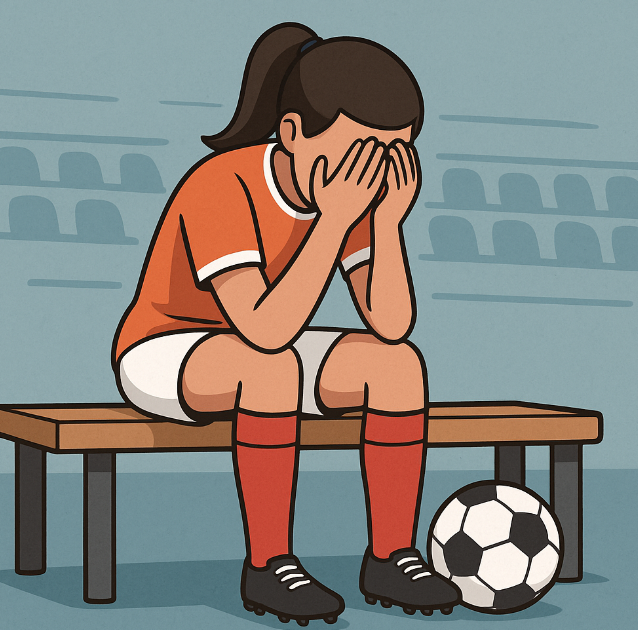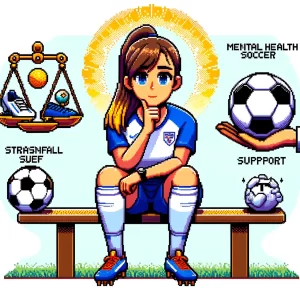
The Hidden Battle Behind the Beautiful Game
Picture a full squad before kickoff: 25 athletes ready to give everything for the badge. Now imagine nine of them quietly battling depression, anxiety, or another mental health challenge. That’s the reality for many professional soccer players today.
Mental health isn’t just a side issue—it’s central to performance, development, and long-term player wellbeing. And yet, surveys show that most players feel they don’t get enough support during their careers. The good news? Research provides a roadmap for how clubs, coaches, and staff can make that change.
A new study, published in Frontiers in Psychology, introduces a stepped-care model of mental health provision specifically designed for professional soccer academies. It clarifies who should do what—from coaches and player care staff to sports psychologists and clinicians—and offers lessons every club can act on.
What Is the Stepped-Care Pathway?
Think of the model as a pyramid of support:
- Base level: Everyday staff like coaches, physios, and nutritionists play a role. They can notice early warning signs and direct players to trusted resources.
- Next step: Player Care staff step in with off-field support—housing, education, family concerns, or life stressors that can impact performance.
- Higher level: Sports psychologists help players manage performance anxiety, focus, and resilience. Some are trained in therapies like cognitive-behavioral approaches.
- Top tier: Qualified clinicians (mental health nurses, counselors, psychiatrists) take over for severe or complex cases. They diagnose, treat, and coordinate care across the system.
Most issues never need to reach the top. When lower levels are trained and supported, everyday stressors can be managed early—before they spiral into major problems.
Why This Matters for Soccer Clubs
Mental health doesn’t exist on a simple “healthy vs. unhealthy” switch. It’s a continuum: from illness, to coping, to thriving in peak performance zones. For clubs, this means three key opportunities:
- Promote wellbeing – teach players strategies to manage stress, balance pressures, and build resilience.
- Prevent illness – spot early signs of distress and provide low-level interventions.
- Treat serious issues – ensure clear referral routes to trained clinicians.
Burnley FC Academy is already piloting this model. Early results show success depends on four factors: raising mental health literacy for all staff and players, clarifying roles, improving communication across departments, and safeguarding confidentiality
Lessons for Coaches and Clubs
The study emphasizes that mental health is everyone’s business. Here are three actionable takeaways:
- Train your staff. Coaches and physios should know how to recognize distress and start supportive conversations. Even pointing players toward credible self-help apps can make a difference.
- Protect confidentiality. Players won’t seek help if they fear it will affect selection or contracts. Clear boundaries and strict confidentiality protocols are non-negotiable.
- Integrate care teams. Player Care staff, psychologists, and clinicians must collaborate rather than compete. Regular multidisciplinary meetings keep everyone aligned.
The Clinician Question: In-House or External?
Should clubs hire full-time clinicians, or rely on outside experts?
- In-house advantages: Faster access, better understanding of club culture, and consistent relationships.
- In-house drawbacks: Players may fear being seen entering a therapist’s office, or worry disclosures could affect their career.
- External clinicians: Offer greater confidentiality and specialist expertise, but may feel disconnected from the day-to-day realities of the club.
There’s no one-size-fits-all solution. The key is clear communication, trust, and leadership support from head coaches and senior staff.
Building a Culture of Mental Wealth
Ultimately, mental health provision is more than structures and roles. Players will only use these services if they trust the people involved. That trust comes from culture—when senior coaches openly support mental health initiatives, when teammates treat seeking help as a sign of strength, and when players see wellbeing linked to performance.
As one review noted, athletes with well-managed mental health conditions can still perform at the highest levels. Supporting them doesn’t just protect health—it sustains careers and strengthens clubs.
Your Turn to Kick It Off
Mental health in soccer is no longer optional—it’s essential. This research shows us how to get it right.
Now, let’s hear from you:
- How does your club currently support player mental health, and where are the gaps?
- Would your players feel safe talking to an in-house clinician, or would external support be better?
- What’s one step your team could take this season to build a more supportive culture?
Share your thoughts in the comments or on social media. Together, we can make the game stronger—on and off the pitch.



